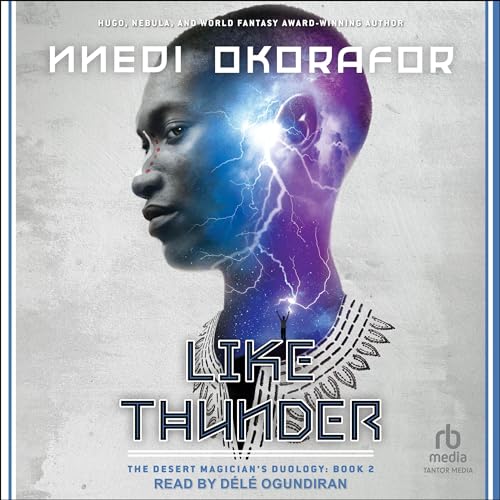 Like Thunder (The Desert Magician's Duology #2)
Like Thunder (The Desert Magician's Duology #2) by
Nnedi Okorafor Narrator: Délé Ogundiran Format: audiobook,
eARC Source: supplied by publisher via NetGalley Formats available: hardcover, ebook, audiobook
Genres: African Futurism,
climate fiction,
fantasy,
science fiction Series: Desert Magician's Duology #2 Pages: 336
Length: 10 hours and 23 minutes
Published by DAW,
Tantor Audio on November 28, 2023
Purchasing Info: Author's Website,
Publisher's Website,
Amazon,
Barnes & Noble,
Kobo,
Bookshop.org,
Better World Books Goodreads This brand-new sequel to Nnedi Okorafor’s Shadow Speaker contains the powerful prose and compelling stories that have made Nnedi Okorafor a star of the literary science fiction and fantasy space and put her at the forefront of Africanfuturist fiction
Niger, West Africa, 2077
Welcome back. This second volume is a breathtaking story that sweeps across the sands of the Sahara, flies up to the peaks of the Aïr Mountains, cartwheels into a wild megacity—you get the idea.
I am the Desert Magician; I bring water where there is none.
This book begins with Dikéogu Obidimkpa slowly losing his mind. Yes, that boy who can bring rain just by thinking about it is having some…issues. Years ago, Dikéogu went on an epic journey to save Earth with the shadow speaker girl, Ejii Ubaid, who became his best friend. When it was all over, they went their separate ways, but now he’s learned their quest never really ended at all.
So Dikéogu, more powerful than ever, reunites with Ejii. He records this story as an audiofile, hoping it will help him keep his sanity or at least give him something to leave behind. Smart kid, but it won’t work—or will it?
I can tell you it won’t be like before. Our rainmaker and shadow speaker have changed. And after this, nothing will ever be the same again.
As they say, ‘ Onye amaro ebe nmili si bido mabaya ama ama onye nyelu ya akwa oji welu ficha aru .’
Or, ‘If you do not remember where the rain started to beat you, you will not remember who gave you the towel with which to dry your body.’
My Review:
Like Thunder is the second half of the Desert Magician’s Duology, and the follow-up to the utterly excellent Shadow Speaker. Like that first book, Like Thunder is a story within a story, as the whole duology is a tale of a possible future, and a lesson to be learned, told by the Desert Magician himself.
But it is not the Desert Magician’s story, no matter how much that being meddled with the characters and the events that they faced. Just as Shadow Speaker was the story of Eiji Ugabe, the titular shadow speaker herself, Like Thunder represents her best friend Dikéogu Obidimkpa’s side of the events that followed.
Shadow speaking is but one of the many transformations and strange, new powers brought into this world after the ‘peace bombs’ were dropped and the oncoming nuclear catastrophe was transformed into something survivable for the human population.
A survival that seems to be more contingent on the adaptability of not just the humans of Earth, but also the sentient populations of ALL the worlds that have become interconnected after Earth’s ‘Great Change’ caused a ‘Great Merge’ of several formerly separated worlds.
The story in Shadow Speaker very much represented Eiji’s perspective on the world, as Eiji’s first impulse is always to talk, and to listen. An impulse that combines her youthful belief that people CAN be better if given the opportunity, and is likely a result of her talent for speaking with not just the shadows of the dead, but directly into the minds of other people and animals.
Her talent is to see others’ points of view and to project her own. She’s young enough to believe that if there is understanding, there can be peace.
Like Thunder is not Eiji’s story, and it shouldn’t be. Instead, it’s a kind of mirror image. Just as Eiji’s talent leads her to foster peace and understanding, her friend Dikéogu’s talent is violent. Dikéogu is a stormbringer, someone who brings all of the violence of nature and all of the violence visited upon him in his scarred past to every encounter with his friends, with his enemies, and with his world.
And within himself.
The world through which we follow Dikéogu in this concluding volume of the Desert Magician’s Duology is the direct result of Eiji’s peacemaking in her book. Because, unfortunately for the world but fortunate for the reader enthralled with their story, Eiji didn’t really make peace because peace is not what most of the people present for the so-called ‘peace conference’ had any desire for whatsoever.
And have been maneuvering in the background to ensure that the only peace that results in the end is the peace of the grave. Someone is going to have to die. Too many people already have. It’s only a question of whether Dikéogu and Eiji’s feared and reviled powers will save the world – or end it.
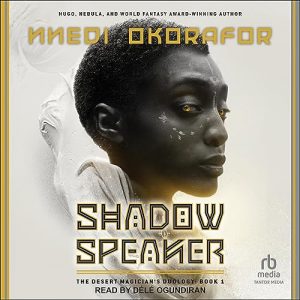 Escape Rating A-: As much as I loved Shadow Speaker, I came into this second book with some doubts and quibbles – all of which were marvelously dashed to the ground at the very beginning of Dikéogu’s story.
Escape Rating A-: As much as I loved Shadow Speaker, I came into this second book with some doubts and quibbles – all of which were marvelously dashed to the ground at the very beginning of Dikéogu’s story.
Eiji and Dikéogu were both very young when their adventure began, but by the time they met they had both already seen enough hardship and disaster to fill a whole lifetime for someone else. But Eiji was just a touch older than Dikéogu, and the differences between her fourteen and his thirteen mattered a lot in terms of maturity.
In other words, Eiji was definitely on the cusp of adulthood in her book, making adult decisions with huge, literally world-shaking consequences, while Dikéogu frequently came off as a whiny little shit, an impression not helped AT ALL by the higher pitched voice used by the narrator for his character.
Dikéogu had PLENTY of reasons for his hatreds and his fears – but that doesn’t mean that they were much more enjoyable to listen to than they were to experience. Less traumatic, certainly, but awful in an entirely different way.
But Like Thunder takes place AFTER the events of Shadow Speaker. (This is also a hint that neither book stands on its own) Whiny thirteen becomes traumatized fifteen with more experience, a bit more closure for some of the worst parts, a bit more distance from terrible betrayals – and his voice drops. (This last bit, of course, doesn’t matter if you’re reading the text and hearing your own voice in your head, but matters a lot in audio.)
Dikéogu’s life experience, particularly after he was sold into slavery by his own uncle at the age of twelve, have taught him that the world is pain and strife and that he has to defend himself at all times and that people will believe ANYTHING if it allows them to stay comfortable and maintain their illusions and their prejudices.
He learned that last bit from his parents, Felecia and Chika Obidimkpa, the power couple of THE West African multimedia empire. They betrayed him into slavery, they betrayed him by pretending he was dead, they betray him every single time they broadcast a program filled with ridiculous nostalgia for a past that never was and disallows and disavows Dikéogu’s existence as a stormbringer, a ‘Changed One’ with powers granted by the ‘Great Change’ they hate so much.
It’s no surprise that his parents are in league with his enemies.
What is a surprise, especially to Dikéogu, is how much of his story, how much of his trauma and how many of his tragedies, are directly traceable to that first betrayal AND his inability to deal with its consequences to himself and the magic he carries.
So, very much on the one hand, Like Thunder is a save the world quest with a surprising twist at its end. A twist at least partly manufactured, and certainly cackled over, by the Desert Magician. And absolutely on the other hand, it’s a story about a young man learning to live with the person he has become – and very nearly failing the test. ALL the tests.
Whichever way you look at it, it is compelling and captivating from the first page – or from the opening words – until the very last line of the Desert Magician congratulating themself on a tale well told and a heartbreaking but ultimately hopeful message delivered.


 Current Giveaways:
Current Giveaways: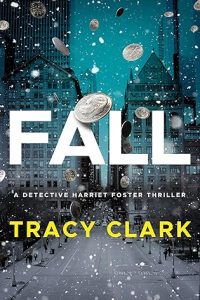 Blog Recap:
Blog Recap: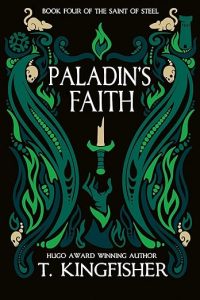 Christmas Day 2023 (Guest Post by Galen)
Christmas Day 2023 (Guest Post by Galen)











 The Butterfly Collector by
The Butterfly Collector by  Escape Rating B: I have to say that I ended up with mixed feelings all over the place while listening to and reading The Butterfly Collector. In the end, the 1922 story carried me through, but it’s the 1868 story that held the most bone-chilling horrors. Real-life horror, like revenge, is compellingly served ice cold – and the horrors of this story, based on real historical events – had plenty of chills to deliver.
Escape Rating B: I have to say that I ended up with mixed feelings all over the place while listening to and reading The Butterfly Collector. In the end, the 1922 story carried me through, but it’s the 1868 story that held the most bone-chilling horrors. Real-life horror, like revenge, is compellingly served ice cold – and the horrors of this story, based on real historical events – had plenty of chills to deliver. Once I switched to text it all got better, and I was able to finally be captured by the increasingly frenetic pace of the mystery of it all. Not just a terrible crime, but decades of a profitable series of terrible crimes come to light and sticks a knife into Verity’s heart AND her perceptions of her family’s history in a way that makes the whole story both sing and sting at the same time.
Once I switched to text it all got better, and I was able to finally be captured by the increasingly frenetic pace of the mystery of it all. Not just a terrible crime, but decades of a profitable series of terrible crimes come to light and sticks a knife into Verity’s heart AND her perceptions of her family’s history in a way that makes the whole story both sing and sting at the same time.





 Like Thunder (The Desert Magician's Duology #2) by
Like Thunder (The Desert Magician's Duology #2) by  Escape Rating A-: As much as I loved
Escape Rating A-: As much as I loved 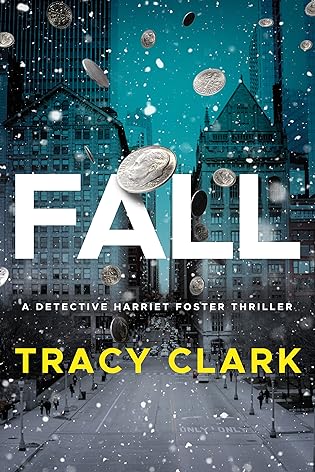 Fall (Detective Harriet Foster #2) by
Fall (Detective Harriet Foster #2) by  Escape Rating A++: I finished this at 3 in the morning because I simply could not put it down. I mean, I tried, but I just couldn’t let this one go until the end. An ending like black coffee, tasty but bitter, with a solid kick at the finish.
Escape Rating A++: I finished this at 3 in the morning because I simply could not put it down. I mean, I tried, but I just couldn’t let this one go until the end. An ending like black coffee, tasty but bitter, with a solid kick at the finish.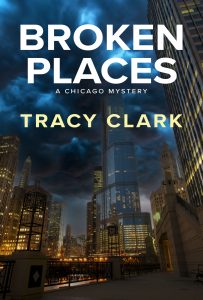 Anytime that a story keeps me up until 3 in the morning, I want more than I have. Not more of this particular book, because it was the right story at the right length at the right time, but more like this or more of these characters or both. Definitely both.
Anytime that a story keeps me up until 3 in the morning, I want more than I have. Not more of this particular book, because it was the right story at the right length at the right time, but more like this or more of these characters or both. Definitely both.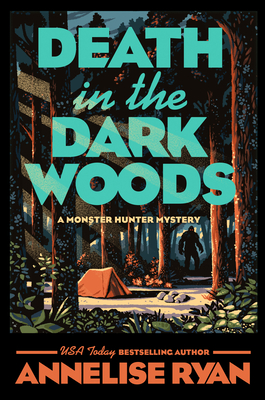 Death in the Dark Woods (Monster Hunter Mystery #2) by
Death in the Dark Woods (Monster Hunter Mystery #2) by  Escape Rating A-: So far, at least, the
Escape Rating A-: So far, at least, the 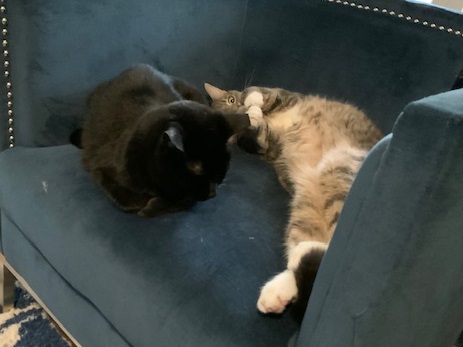
 Current Giveaways:
Current Giveaways: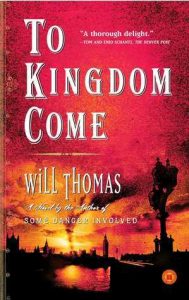 Blog Recap:
Blog Recap: Coming This Week:
Coming This Week:






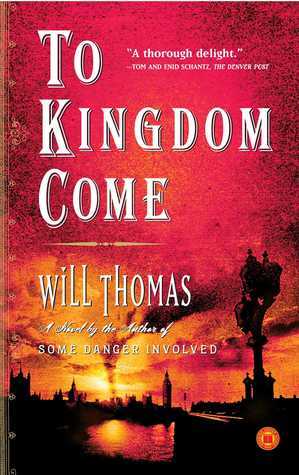 To Kingdom Come (Barker & Llewelyn, #2) by
To Kingdom Come (Barker & Llewelyn, #2) by 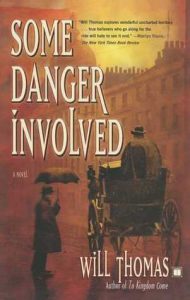 After the events of the first marvelous book in this series,
After the events of the first marvelous book in this series, 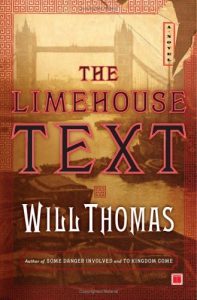 What kept me glued to my seat (as this turned out to be a one-sitting/one-evening read) was the way that it dove head-first both into the heart of its point-of-view character Thomas Llewelyn and into the hearts and motivations of the Irish Republican Brotherhood faction members, and the difficulty that Llewelyn had separating himself from them and his sympathy for their cause even as he decried their methods and worked to bring them down, doing his best to keep them all from being blown “to kingdom come”.
What kept me glued to my seat (as this turned out to be a one-sitting/one-evening read) was the way that it dove head-first both into the heart of its point-of-view character Thomas Llewelyn and into the hearts and motivations of the Irish Republican Brotherhood faction members, and the difficulty that Llewelyn had separating himself from them and his sympathy for their cause even as he decried their methods and worked to bring them down, doing his best to keep them all from being blown “to kingdom come”.